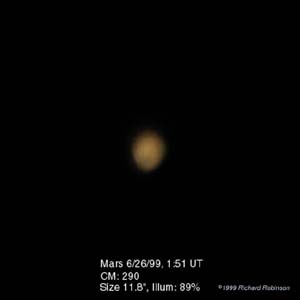 |
Scope:
8" LX 200 SCT
|
| MX-5C CCD Camera | |
| This was my best image of Mars during the 1998-1999 Apparition. My LX 200 and MX-5C arrived in Jun 1999, so I missed the best imaging opportunities. Just wait til next time! | Focal Ratio: f20 |
| Exposure: 0.4 Sec | |
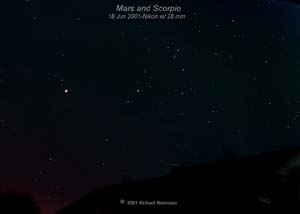
This is a wide angle photo showing the location of Mars and the constellation Scorpio on 18 Jun 2001. Click here for a larger image. |
Scope: Nikon 28 mm |
| Kodak Max 800 film | |
| Focal Ratio: f3.5 | |
| Exposure: 5 min | |
 This is my first image of Mars in 2001. It was really just a centering image before I switched to the f30 optical configuration, but it shows what Mars might look like in a 6"-8" scope at 100-150 power. Yep--pretty small. |
Scope:
8" LX 200 SCT
|
| MX-5C CCD Camera | |
| Focal Ratio: f10 | |
| Exposure: 0.005 sec | |
 Well, I think it is Demos. I've retouched the image in Photoshop to remove the glare from Mars. The object I've marked as Demos is in about the right place. Click here for an un-retouched image and explanation why I think it is Demos. |
Scope:
8" LX 200 SCT
|
| MX-5C CCD Camera | |
| Focal Ratio: f10 | |
| Exposure: 0.005 sec for Mars, 10 two sec exposures for Demos and stars | |
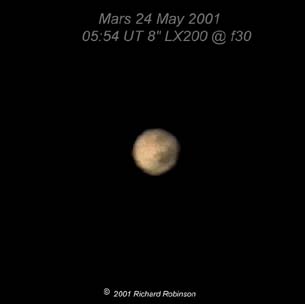
This was my primary image of the 24 May imagining session. I took about 200 images. This is an average of three of the best taken during a moment of relative good seeing. Mars is low in the southern sky for Northern Observers during this apparition, so it is difficult to get a sharp image. Central Meridian is about 80 degrees. Mars appears to be about 1/2 the size of Jupiter in this image. Click here for a short animation. |
Scope:
8" LX 200 SCT
|
| MX-5C CCD Camera | |
| Focal Ratio: f30 | |
| Exposure: Average three 0.08 sec exposures | |
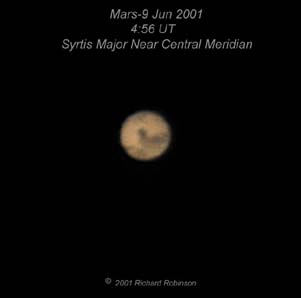
The orientation in this image closely matches the Meridian screen capture below. The central meridian is about 300 degrees. Click here for an animation. |
Scope:
8" LX 200 SCT
|
| MX-5C CCD Camera | |
| Focal Ratio: f30 | |
| Exposure: 0.1 sec | |
 |
This is a screen capture from the freeware Program Meridian. It shows how the planet Mars should look when the central meridian is 300 degrees. This will put the surface feature, Syrtis Major, just to the right of the center of the planet as seen from Earth. Click here for a list of dates and times during the 2001 Apparition when the central meridian will be 300 degrees. |
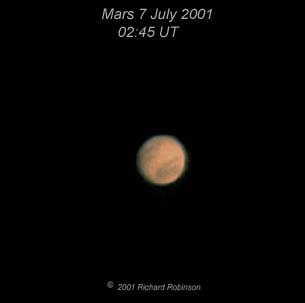
The central meridian for this image is about seven degrees. |
Scope:
8" LX 200 SCT
|
| MX-5C CCD Camera | |
| Focal Ratio: f30 | |
| Exposure: Average of four 0.08 sec | |
| Click
Here to see a complete list of Apparitions for the next 100 years
Click Here to visit the Astronomical League Site with lots of images from the 1998-1999 Apparition. Click Here to visit the USGS Mars Global Surveyor Image site. |
 |
|
|